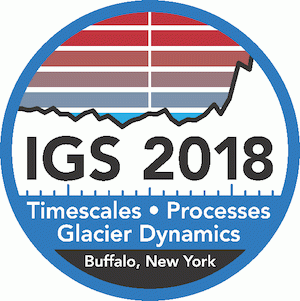
The International Glaciological Society will hold an International Symposium on ‘Timescales, Processes and Glacier Dynamics’ in 2018. The symposium will be held at the Lafayette Hotel in downtown Buffalo, New York.
Theme:
The physical processes controlling glacier dynamics form the basis of modern glaciology. In spite of the rapid growth in observational data, the ultimate scientific challenge continues to be relating observations to processes. Time-series observational data are essential to understanding processes; however, their analysis often reveals processes operating on timescales ranging from diurnal to millennial. Individual processes may underpin long-term glacier stability, promote instability or drive natural variability in the glacier state. For example, gravitationally driven flow is among the most fundamental processes in glaciology and is controlled by ice-surface slope and thickness. The evolution of the ice surface, in turn, reveals processes related to the mechanical controls on ice flow, firn compaction, development of supraglacial meltwater flow networks, basal melt, isostasy and surface mass balance. Each of these processes alters the surface elevation and is characterized by a different timescale. Assessment of the processes producing changes over a particular time interval poses a major challenge. Hence, even routinely acquired data are difficult to reason about. Interpretation of other data, such as surface velocity, climatological data, radar stratigraphy, glacier history, ice core records, paleoclimate proxies and in situ observations, are also confounded by relations between processes and timescales.
Topics:
We seek papers and presentations that advance the understanding of ice sheets and glaciers and glacier dynamics on different timescales. Key focus areas include (but are not limited to):
- Processes that control glacier dynamics and ice flow
- Processes that reflect natural variability versus trends critical to glacier and ice-sheet stability
- Processes that link climate and ocean changes with ice sheet and glacier evolution
- Time-series data analysis of glacier and ice-sheet data
- Process models for ice–ocean–atmosphere interactions, glacier–bedrock interactions, meltwater impacts, etc.
- Processes and timescales associated with ice-sheet and glaciological hazards
- Paleoclimate indicators of key-processes and changes in glaciers, ice caps, and ice sheets and linking paleoclimatology to contemporary glacier studies.
Abstracts:
Participants who wish to present a paper (oral or poster) at the Symposium will be required to submit an abstract by 3 April 2018.
For more information, please follow the link above.
